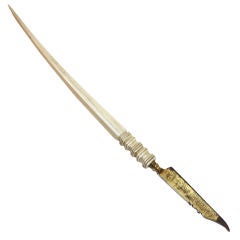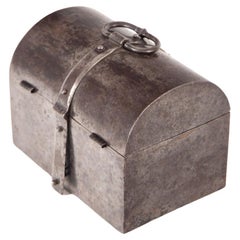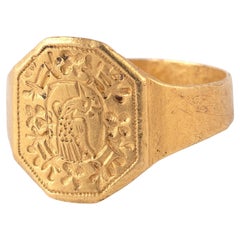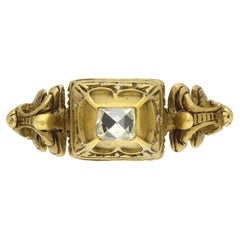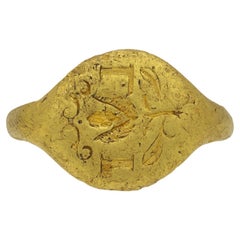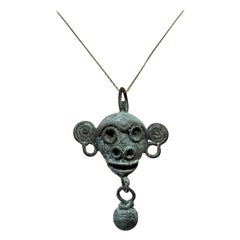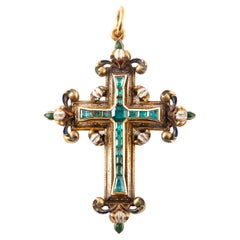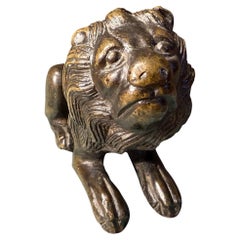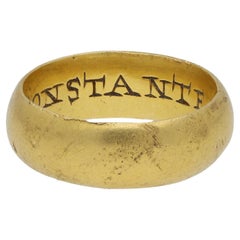16th Century Jewelry
European Jewelry
Stainless Steel, 24k Gold
Antique 16th Century German Baroque Jewelry Boxes
Iron
Antique 16th Century British Renaissance Signet Rings
Gold, 22k Gold
Antique 16th Century Unknown Renaissance Solitaire Rings
Diamond, Yellow Gold
Antique 16th Century Medieval Signet Rings
Yellow Gold
Antique 16th Century Mexican Native American Pendant Necklaces
Copper
Antique 16th Century Italian Renaissance Pendant Necklaces
Emerald, Gold, 18k Gold, Enamel
Antique 16th Century Figurines and Sculptures
Antique 16th Century Band Rings
Antique 16th Century British Tudor Solitaire Rings
Spinel, Gold
Antique 16th Century Signet Rings
Antique 16th Century Unknown Cluster Rings
Sapphire, Yellow Gold, Gold
Antique 16th Century Italian Boxes and Cases
22k Gold, Stainless Steel, Gold, Steel
Antique 16th Century Band Rings
Yellow Gold
Antique 16th Century Italian Renaissance Pendant Necklaces
Agate, 18k Gold, Yellow Gold
Antique 16th Century Solitaire Rings
Diamond, Yellow Gold
Antique 16th Century Figurines and Sculptures
Antique 16th Century Medieval Band Rings
Antique 16th Century Italian Renaissance Engagement Rings
Chalcedony, 22k Gold
Antique 16th Century Lithuanian Renaissance Band Rings
Ruby, Gold, 22k Gold, Enamel
Antique 16th Century French Medieval Pendant Necklaces
Emerald, 18k Gold, Silver
Antique 16th Century French Renaissance Enamel Frames and Objects
Bronze, Copper, Enamel
Antique 16th Century European Renaissance Brooches
Gilt Metal, Niello, Silver, Copper
Antique 16th Century Italian Jewelry Boxes
Wood
Antique 16th Century Barware
Silver
Antique 16th Century Pendant Necklaces
Antique 16th Century Italian Renaissance Signet Rings
Agate, Gold, 18k Gold, Silver
Antique 16th Century Italian Renaissance Signet Rings
Agate, Gold, 18k Gold, Silver
Antique 16th Century Unknown Band Rings
Yellow Gold
Antique Late 19th Century Prints
Paper
Antique 16th Century Medieval Band Rings
Antique 16th Century More Jewelry
Antique 16th Century Edwardian Brooches
Diamond, Pearl, Sapphire, 14k Gold, Yellow Gold
Antique 16th Century Art Deco Bangles
Gold
Antique 16th Century European Art Deco Beaded Bracelets
Diamond, Pearl, Platinum
Antique 16th Century European Art Deco Beaded Bracelets
Diamond, Pearl, Platinum
Antique 16th Century Pendant Necklaces
Coral, 14k Gold
Antique 16th Century Pendant Necklaces
Gold, 14k Gold, Silver
Antique 16th Century Spanish Pendant Necklaces
22k Gold
Antique 16th Century French Renaissance Pendant Necklaces
Silver, Gilt Metal
Antique 16th Century Renaissance Solitaire Rings
Diamond, Enamel
Antique 16th Century Loose Gemstones
Diamond
Antique 16th Century Renaissance Pendant Necklaces
14k Gold, 22k Gold, Rose Gold, Enamel
Antique 16th Century Art Deco Drop Earrings
14k Gold, Yellow Gold
Antique 16th Century Stud Earrings
Diamond, Platinum, Silver
Antique 16th Century Fashion Rings
Emerald, Ruby, 14k Gold, Yellow Gold
Antique 16th Century Italian Renaissance Signet Rings
Agate, Gold
Antique 16th Century Art Deco Pendant Necklaces
14k Gold, Yellow Gold
Antique 16th Century Cluster Rings
Diamond, Emerald, Ruby, 14k Gold, Yellow Gold
Antique 16th Century Italian Renaissance Pendant Necklaces
Crystal, Silver, Enamel, Copper, Gold
Antique 16th Century Cocktail Rings
Ruby, Gold, Yellow Gold
Antique 16th Century European Renaissance Pendant Necklaces
Crystal, Rock Crystal, Silver
Antique 16th Century Burmese Baroque Loose Gemstones
Spinel
Antique 16th Century More Rings
Ruby, Gold, 18k Gold
Antique 16th Century Venezuelan Pendant Necklaces
Gold, 22k Gold, Yellow Gold
Antique 16th Century European Baroque Fashion Rings
Amethyst, 18k Gold
Antique 16th Century More Rings
Diamond, Sapphire, Gold, 18k Gold
- 1
16th Century Jewelry For Sale on 1stDibs
How Much is a 16th Century Jewelry?
- 1stDibs ExpertApril 5, 2022Yes, the history of glass-making goes back much further than the 1600s. It’s believed that they were making glass in different parts of the world at least 3,600 years ago, maybe even longer. During the late Bronze Age in Egypt and in Western Asia, glassmarking advanced significantly and was manipulated extensively to produce vessels, jewelry, and works of art. Shop a range of antique and vintage glass on 1stDibs.
- 1stDibs ExpertMarch 22, 2022Yes, there were cannons in the 16th century. The history of the weapon dates back to 12th-century China. Historical records suggest that the first cannons appeared in Europe during the Islamic wars in Iberia in the 13th century. Find a range of antique cannons on 1stDibs.
- 1stDibs ExpertApril 5, 2022A variety of furniture was used during the 16th century. Items commonly found in homes include high-backed armchairs, chests, stools, benches and cupboards. Most European artisans active during the time period produced pieces out of oak wood. Find a large collection of antique furniture on 1stDibs.
- What is mid-century jewelry?1 Answer1stDibs ExpertApril 5, 2022Mid-century jewelry is a style of jewelry that rose in popularity along with the mid-century modern design movement. Pieces from this era typically feature bold, geometric designs. Shop a variety of mid-century jewelry and accessories from some of the world’s top dealers on 1stDibs.
- 1stDibs ExpertApril 5, 2022What painting is the most important of the 20th century is largely a matter of personal opinion. Some notable works produced during the period include Paul Cézanne's Mont Sainte-Victoire, Pablo Picasso's Les Demoiselles d'Avignon, Henri Matisse's The Dance and Jackson Pollock's Lavender Mist. Shop a large selection of 20th-century paintings on 1stDibs.
- 1stDibs ExpertSeptember 23, 2024What 17th-century furniture is called varies. The general term for all furniture produced 100 years ago, including 17th-century pieces, is antique furniture. You may also choose to be more specific and describe a piece by its style. Theatrical and lavish, the Baroque style was prevalent across Europe from the 17th to the mid-18th century and spread around the world through colonialism, including in Asia, Africa and the Americas. Baroque furniture was extravagant in all aspects, from shape to materials. 17th-century pieces from England often feature characteristics of the William and Mary style, such as crisp lines, maple and walnut veneers, inlaid bands and C-scroll ornaments. On 1stDibs, explore a variety of antique furniture.
- 1stDibs ExpertNovember 13, 2024To identify 18th-century furniture, you can research your piece in the context of the prevailing styles of the period or consult a certified appraiser or experienced antique dealer. To identify your item on your own, look over it for maker's marks, such as carvings, stamps, brands and labels. Researching the marking can help you determine the maker of your piece, and from there, you can search further to learn more about your particular item. Without a maker's mark, the best approach is to consider the characteristics of the dominant furniture styles during the 18th century. In England, these included William and Mary, Queen Anne, Georgian, Chippendale, Hepplewhite and Sheraton. Some French furniture styles of the 1700s include Louis XV, Louis XVI and Régence. Find a diverse assortment of 18th-century furniture on 1stDibs.
- 1stDibs ExpertApril 5, 2022Yes, wedding rings have a long history, stretching back to ancient Egypt. The first diamond engagement ring was created in 1477 by Archduke Maximillian of Austria. Browse a wide array of vintage and contemporary wedding rings on 1stDibs.
- 1stDibs ExpertApril 5, 2022In the 18th century, art changed in style from Baroque to Rococo and Neoclassicism. Art became more ornamented and idealized during the Rococo period and then shifted toward a style that emulated the artwork of ancient Greece and Rome near the end of the century. You’ll find a variety of fine art on 1stDibs.
- 1stDibs ExpertApril 5, 2022Sir Isaac Newton invented the reflector telescope in the 17th century. He created it as a replacement for the refracting telescope, which tended to have poor optics. Find a collection of antique and vintage telescopes on 1stDibs from some of the world’s top sellers.
- 1stDibs ExpertApril 5, 2022One way to check if your brass candlesticks are from the 18th century is to look for the two seams running lengthwise on either side. This is from when the candlestick was molded in two halves and then soldered together. You’ll find a variety of candlesticks of all shapes and sizes from some of the top sellers on 1stDibs.
- 1stDibs ExpertApril 5, 202217th-century Dutch portraiture has many similarities to other Baroque paintings, including rich colors, dark shadows and intense lighting. Many famous Dutch Baroque works lean toward realism. In Dutch portraiture, props and detailed backgrounds are uncommon. You'll find a collection of Dutch Baroque paintings from some of the world’s top art dealers on 1stDibs.
- 1stDibs ExpertApril 5, 2022British artist John Singer Sargent was one of the most important portrait painters of the 19th century. Other notable portraitists from the period include James Abbott McNeill Whistler, Eugène Delacroix, Théodore Géricault, Gustave Courbet, Édouard Manet, Mary Cassat, Claude Monet and Pierre-Auguste Renoir. On 1stDibs, find a wide variety of portrait paintings.
- 1stDibs ExpertJanuary 10, 2025The individuals considered the Big Three of 18th-century cartoons are William Hogarth, James Gillray and George Cruikshank. Although the 18th century saw a widespread increase in illustrations in newspapers, these three illustrators were particularly well-known for their work. Hogarth's work was extremely diverse, ranging from serious, realistic paintings and portraits to satirical and moralistic illustrations filled with symbolism. A British caricaturist, Gillray is remembered today for his artworks representing political and social satires, like his political cartoons against George III of England. Despite being a prolific caricaturist, Cruikshank is now most famous for illustrating the works of Charles Dickens. On 1stDibs, find a wide variety of illustrations.
- 1stDibs ExpertApril 5, 2022The French painters of the 19th century worked in two styles. Neoclassicism dominated the first half of the century, and Impressionism was the most common style during the second half. On 1stDibs, you can find a variety of French paintings.
- 1stDibs ExpertApril 5, 2022At the end of the 17th century, Europe went into a frenzy over porcelain. Asian porcelain was highly sought after, and spurred the foundation of the Meissen factory in France, where hard porcelain went on to be made. You’ll find a large collection of porcelain pieces from many of the world’s top sellers on 1stDibs.
